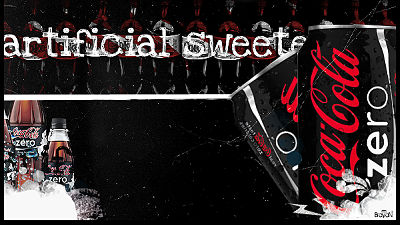Studies show that zero-calorie diet drinks increase food cravings, especially for 'women and obese people.'

Drinks containing sugar are known to be unhealthy,
Obesity and Sex-Related Associations With Differential Effects of Sucralose vs Sucrose on Appetite and Reward Processing: A Randomized Crossover Trial | Nutrition | JAMA Network Open | JAMA Network
https://jamanetwork.com/journals/jamanetworkopen/fullarticle/2784545
Artificial sweeteners in drinks may increase food cravings and appetite, study reveals
https://www.news-medical.net/news/20210928/Artificial-sweeteners-in-drinks-may-increase-food-cravings-and-appetite-study-reveals.aspx
Diet soda may increase hunger and weight gain: Shots --Health News: NPR
https://www.npr.org/sections/health-shots/2021/10/07/1044010141/diet-soda-may-prompt-food-cravings-especially-in-women-and-people-with-obesity
Diet drinks, which are sugar-free but taste the same as sweet soft drinks, are recognized as a healthier option than soft drinks with large amounts of sugar, and 40% of adults in the United States want to eat sweets. It is said that they are taking artificial sweeteners when they become sick or to lose weight. However, since it has been reported that artificial sweeteners contained in diet drinks are not good for health, such as 'there is a risk of causing impaired glucose tolerance and causing diabetes', sugar and artificial sweetness have been reported. There is disagreement among experts as to which of the fees is healthier.
Artificial sweeteners can cause impaired glucose tolerance and cause diabetes-GIGAZINE

by Brayan Esteban Esparza Gonzalez
It has also been pointed out that studies on the relationship between artificial sweeteners and health often have participants biased towards men and normal weight. Therefore, a research team led by Katie Page, an obesity specialist at the University of Southern California in the United States, asked a total of 74 subjects, including 43 women, 'beverages containing sucrose,' 'beverages containing artificial sweetener sucralose, ' and ' We conducted an experiment to have people drink 'water'. The experiment involved people of various body shapes, from normal weight people with a BMI of 19 to people with a BMI of 40 who are severely obese.
When the research team collected and analyzed the blood of the participants after drinking the drink, those who drank the 'artificial sweetened drink' stimulated a feeling of fullness compared to those who drank the 'sucrose-containing drink'. It has been confirmed that diet drinks have little effect on hunger due to low levels of hormones.
In addition, when the participants' brains were examined by fMRI , the part of the brain that controls appetite, especially when women and obese people drink 'drinks containing artificial sweeteners', compared to when they drink 'beverages containing sucrose'. It was also found that the work of was active. On the other hand, men and people of healthy weight did not have a significant effect on brain activity with any beverage. In addition, as a result of having the participants after the test eat at the buffet, the male participants had no relationship between the type of beverage they drank and the amount they ate in the experiment, while 'beverages with artificial sweeteners'. It is said that the female participants who drank '' ate more than the women who drank 'beverage containing sucrose'.
'In a group of obese people and women, drinking drinks with artificial sweeteners can make you feel hungry, resulting in more calories,' Paige said. It was suggested. '

According to Laura Schmidt, a professor at the University of California, San Francisco, who was interviewed by the American news site NPR, artificial sweeteners stimulate appetite: 'sweets that don't actually consume calories. There is a hypothesis that 'because I have the illusion that I ate.'
Susan Wizards, a behavioral scientist at Purdue University who did not participate in this study, told the interview that 'the brain recognizes that sugar was ingested when it tasted sweet, and the human body prepares for glucose metabolism. However, with diet drinks, sugar does not actually come in. Therefore, the next time the brain feels sweetness, it is difficult to judge whether sugar actually comes in and metabolism. May have been reduced. '
In response to the question, 'Do you think people who want to diet should not drink diet drinks containing artificial sweeteners?', Professor Schmidt said, 'I completely stopped diet drinks for about two weeks and high-calorie foods. You may want to try to put up with your desire for it. '
Related Posts:







